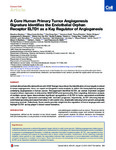A core human primary tumor angiogenesis signature identifies the endothelial orphan receptor ELTD1 as a key regulator of angiogenesis.
| dc.contributor.author | Masiero, M | en |
| dc.contributor.author | Simões, FC | en |
| dc.contributor.author | Han, HD | en |
| dc.contributor.author | Snell, C | en |
| dc.contributor.author | Peterkin, T | en |
| dc.contributor.author | Bridges, E | en |
| dc.contributor.author | Mangala, LS | en |
| dc.contributor.author | Wu, SY-Y | en |
| dc.contributor.author | Pradeep, S | en |
| dc.contributor.author | Li, D | en |
| dc.contributor.author | Han, C | en |
| dc.contributor.author | Dalton, H | en |
| dc.contributor.author | Lopez-Berestein, G | en |
| dc.contributor.author | Tuynman, JB | en |
| dc.contributor.author | Mortensen, N | en |
| dc.contributor.author | Li, J-L | en |
| dc.contributor.author | Patient, R | en |
| dc.contributor.author | Sood, AK | en |
| dc.contributor.author | Banham, AH | en |
| dc.contributor.author | Harris, AL | en |
| dc.contributor.author | Buffa, FM | en |
| dc.date.accessioned | 2016-08-09T15:05:33Z | |
| dc.date.available | 2016-08-09T15:05:33Z | |
| dc.date.issued | 2013-08-12 | en |
| dc.identifier.uri | http://hdl.handle.net/10026.1/5252 | |
| dc.description.abstract |
Limited clinical benefits derived from anti-VEGF therapy have driven the identification of new targets involved in tumor angiogenesis. Here, we report an integrative meta-analysis to define the transcriptional program underlying angiogenesis in human cancer. This approach identified ELTD1, an orphan G-protein-coupled receptor whose expression is induced by VEGF/bFGF and repressed by DLL4 signaling. Extensive analysis of multiple cancer types demonstrates significant upregulation of ELTD1 in tumor-associated endothelial cells, with a higher expression correlating with favorable prognosis. Importantly, ELTD1 silencing impairs endothelial sprouting and vessel formation in vitro and in vivo, drastically reducing tumor growth and greatly improving survival. Collectively, these results provide insight into the regulation of tumor angiogenesis and highlight ELTD1 as key player in blood vessel formation. | en |
| dc.format.extent | 229 - 241 | en |
| dc.language | eng | en |
| dc.language.iso | eng | en |
| dc.subject | Animals | en |
| dc.subject | Cell Growth Processes | en |
| dc.subject | Endothelial Cells | en |
| dc.subject | Female | en |
| dc.subject | Genetic Predisposition to Disease | en |
| dc.subject | HCT116 Cells | en |
| dc.subject | Humans | en |
| dc.subject | Mice | en |
| dc.subject | Mice, Nude | en |
| dc.subject | Neoplasms | en |
| dc.subject | Neovascularization, Pathologic | en |
| dc.subject | Receptors, G-Protein-Coupled | en |
| dc.subject | Signal Transduction | en |
| dc.title | A core human primary tumor angiogenesis signature identifies the endothelial orphan receptor ELTD1 as a key regulator of angiogenesis. | en |
| dc.type | Journal Article | |
| plymouth.author-url | https://www.ncbi.nlm.nih.gov/pubmed/23871637 | en |
| plymouth.issue | 2 | en |
| plymouth.volume | 24 | en |
| plymouth.publication-status | Published | en |
| plymouth.journal | Cancer Cell | en |
| dc.identifier.doi | 10.1016/j.ccr.2013.06.004 | en |
| plymouth.organisational-group | /Plymouth | |
| plymouth.organisational-group | /Plymouth/REF 2021 Researchers by UoA | |
| plymouth.organisational-group | /Plymouth/REF 2021 Researchers by UoA/UoA01 Clinical Medicine | |
| plymouth.organisational-group | /Plymouth/REF 2021 Researchers by UoA/UoA01 Clinical Medicine/UoA01 Clinical Medicine | |
| dc.publisher.place | United States | en |
| dcterms.dateAccepted | 2013-06-06 | en |
| dc.identifier.eissn | 1878-3686 | en |
| dc.rights.embargoperiod | Not known | en |
| rioxxterms.versionofrecord | 10.1016/j.ccr.2013.06.004 | en |
| rioxxterms.licenseref.uri | http://www.rioxx.net/licenses/all-rights-reserved | en |
| rioxxterms.licenseref.startdate | 2013-08-12 | en |
| rioxxterms.type | Journal Article/Review | en |


